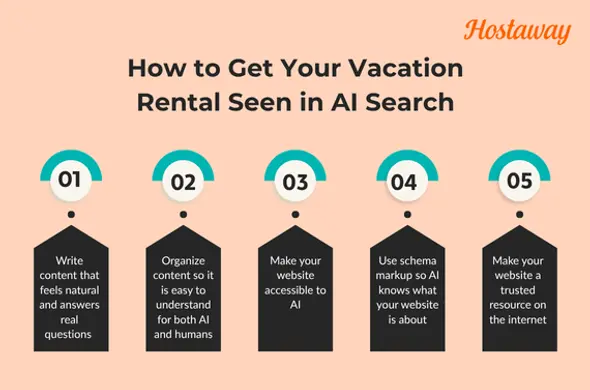AI Marketing for Vacation Rentals: How to Get Found in Generative AI Search

The way people search for information online is changing fast. Tools like ChatGPT, Google’s new AI features and other artificial intelligence (AI) platforms are starting to give people direct answers to their questions — instead of just showing a list of websites.
So what does that mean for your vacation rental business?
It means that in addition to traditional search engines like Google, you now need to make sure your listings, website and content are also easy for AI to find and understand. This article explains what AI-powered search is, why it matters and how you can make sure your vacation rental gets discovered — without needing to become a tech or marketing expert.
%20(1).webp?u=https%3A%2F%2Fimages.ctfassets.net%2Fpqmtoyw9z10u%2F17HQD2bzpyUzyY2P8PqB6M%2F62f762ab6126a3f16b5d36ec45db891c%2F2025-06_-_Direct_Booking_Guide_2025__1___1_.webp&a=w%3D960%26h%3D84%26fm%3Dwebp%26q%3D75&cd=2025-06-12T21%3A40%3A56.494Z)
What Is AI Search?
When we say “AI search,” we’re talking about how tools like Large Language Models (LLMs) or Google’s AI Overviews (AIOs) answer questions. Instead of listing ten blue links like traditional Google search, AI tools give a direct answer — kind of like talking to a really smart assistant.
For example, if a traveler types in: “What’s the best area to stay in Lisbon with kids?” ChatGPT or Google might summarize answers from different websites, including blogs, listings or reviews. If your content is included in that answer, you’ve just been discovered by a potential guest, even if they never visited Google or clicked on your website.
This is where AI marketing comes in: It’s all about making sure your content is easy for these AI tools to find and quote. This doesn’t replace regular search engine optimization (SEO) — it just adds a new layer on top.
Why is AI Search Important for Vacation Rentals?
AI tools are increasingly becoming a seamless part of everyday applications, from voice assistants to personalized recommendations. Being featured in AI search results matters for businesses of all kinds, including vacation rentals.
As of May 2025, ChatGPT boasts approximately 122.6 million daily active users and nearly 800 million weekly users, making it one of the most visited websites globally. Meanwhile, Google's AI Overviews feature now serves over 1.5 billion users monthly across more than 100 countries, indicating a significant shift towards AI-driven search experiences. Plus, in March 2025, AI Overviews were triggered in 13.14% of all Google search queries, up from 6.49% in January, reflecting a 72% growth in just two months.
How to Write Content that Shows Up in AI Search — Tips for Vacation Rentals
You don’t need to learn a new kind of SEO or a brand-new system. The same practices that help you show up in Google search results will also help you show up in AI search results. But there are a few extra steps you need to take to improve your chances.
Let’s walk through them step-by-step.
Step 1: Write content that feels natural and answers real questions
AI tools are trained to understand natural, human language. They’re not looking for fancy marketing words or sales jargon — they’re looking for clear, helpful answers.
Here’s what works well:
Use full-sentence questions as headings
Instead of writing a heading like: “Best Neighborhoods Lisbon”
Write: “What are the best neighborhoods to stay in Lisbon with kids?”
This makes it easier for AI to understand the purpose of that section.
Write like you’re helping a friend
Use a friendly, conversational tone. Avoid overcomplicated language. Pretend you’re explaining something to a guest who’s asking for your advice.
Be detailed and trustworthy
AI tools prefer content that shows real knowledge and experience. Try to include:
Real-life stories from your own hosting experience
Facts, data or reviews
A balanced view (e.g., pros and cons of a location)
Clear and honest answers to potential objections
This approach is sometimes called “E-E-A-T” (Experience, Expertise, Authoritativeness, Trust) — basically, showing that you know your stuff.
Use a variety of related keywords
Instead of repeating the same keyword or phrase (like “Airbnb in Tulum”) over and over, talk about the topic in a natural way. Mention related ideas like “vacation rentals,” “beach stays,” “family-friendly areas” and so on. This gives AI more context to understand your content.
Step 2: Format your content for both humans and AI
Both people and AI tools love organized information. You can make your content easier to read — and more likely to be quoted — by following a few simple tricks:
Use headings and subheadings
Don’t crowd your entire content under a single heading. Break it down into subtopics with subheading. This helps both humans and AI navigate your page and find answers faster.
Use bullet points and lists
Lists are especially helpful for things like:
Step-by-step instructions
Amenities
Pros and cons
For example: Top 3 Reasons to Stay at Our Rental in Asheville
Private hot tub with mountain views
Walking distance to downtown
Family and pet-friendly
Add Frequently Asked Questions (FAQs)
These are perfect for AI tools to pick up. For example:
Q: Does your rental allow pets? A: Yes, we welcome pets under 50 lbs. and provide dog bowls and a fenced yard.
Use tables when comparing things
Tables are great if you want to show things like pricing, amenities or feature comparisons. They’re also easier for AI to read and understand.

Step 3: Make sure AI tools can access your website
Even if your content is great, it won’t matter if AI tools can’t “read” your website. Here’s how to make sure they can:
Check your robots.txt file
This is a small file on your website that tells search engines what they’re allowed to see. Make sure it isn’t blocking important bots like Google or Bing.
To check, just go to your website and add /robots.txt at the end (e.g. www.yoursite.com/robots.txt).
Put your key info in plain text
Don’t hide important content behind images or pop-ups. Make sure your descriptions, FAQs and details are written in standard text on the page.
Keep your website fast and easy to navigate
A clean site structure with fast load times helps both visitors and AI. Make sure your most important pages (like your property listing, about page or blog) are easy to find from the homepage.
Step 4: Use schema markup
Schema markup is just behind-the-scenes code that gives search engines and AI tools extra information about your website. It doesn’t affect what your guests see, but it makes it easier for AI to know what your website is about.
Here are a few types you should consider:
Organization schema: Tells AI your business name, logo and what you do.
Article schema: Used on blog posts, this helps AI know who wrote it, when it was published and what it’s about.
FAQ schema: Makes your questions and answers more visible in search.
You don’t need to code this yourself. Many website platforms (like WordPress or Wix) offer plugins or settings that help you add schema automatically.
Step 5: Build trust across the internet
AI doesn’t just look at your website — it looks at what other sites say about you, too. Here’s how to achieve trust across the world wide web.
Get mentioned by other websites
If a local travel blogger writes about your vacation rental, or a newspaper includes you in a “Best Places to Stay” roundup, that helps build trust in the eyes of AI.
Get listed in directories
Make sure your business appears on:
Yelp
Apple Maps
LinkedIn (as a business)
Travel or hospitality directories
Bonus tip: If you don’t have a Wikipedia page, consider adding your business to Wikidata — a public database often used by AI tools.
Cover your topic from all angles
The more high-quality content you create on related topics (like guides to your area, tips for guests, etc.), the more likely AI is to include your website in its answers.
It’s Not Magic, It’s Just Smart SEO
You don’t need to learn a brand-new system to succeed in AI search. If you focus on:
Writing helpful, human-friendly content
Organizing your site clearly
Making your brand trustworthy and easy to understand
…then you’re already ahead of the curve.
AI search is growing, but it’s still based on the same foundation: Good content, strong structure and real value. By making a few tweaks to how you create and share information online, you can ensure your vacation rental is ready for the future of search.
And with an all-in-one vacation rental software like Hostaway to support you, you can manage multiple listings, boost your bookings and get found on every booking platform — from Airbnb to Google Vacation Rentals to Hopper.
Ready to find out how Hostaway can transform your business?
